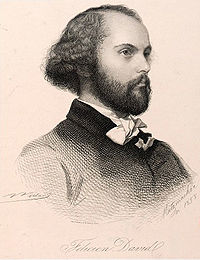
Félicien-César David
Encyclopedia


France
The French Republic , The French Republic , The French Republic , (commonly known as France , is a unitary semi-presidential republic in Western Europe with several overseas territories and islands located on other continents and in the Indian, Pacific, and Atlantic oceans. Metropolitan France...
composer
Composer
A composer is a person who creates music, either by musical notation or oral tradition, for interpretation and performance, or through direct manipulation of sonic material through electronic media...
.
Biography
Félicien David was born in CadenetCadenet
Cadenet is a commune in the Vaucluse department in the Provence-Alpes-Côte d'Azur region in southeastern France.-Jewish community:Like all places situated along the river Durance, Cadenet had a Jewish community in the Middle Ages...
(Vaucluse
Vaucluse
The Vaucluse is a department in the southeast of France, named after the famous spring, the Fontaine-de-Vaucluse.- History :Vaucluse was created on 12 August 1793 out of parts of the departments of Bouches-du-Rhône, Drôme, and Basses-Alpes...
), France
France
The French Republic , The French Republic , The French Republic , (commonly known as France , is a unitary semi-presidential republic in Western Europe with several overseas territories and islands located on other continents and in the Indian, Pacific, and Atlantic oceans. Metropolitan France...
, and began to study music at five under his father, whose early death however left him an impoverished orphan. His good voice enabled him to study as a choirboy at the Church of Saint-Saveur in Aix-en-Provence
Aix-en-Provence
Aix , or Aix-en-Provence to distinguish it from other cities built over hot springs, is a city-commune in southern France, some north of Marseille. It is in the region of Provence-Alpes-Côte d'Azur, in the département of Bouches-du-Rhône, of which it is a subprefecture. The population of Aix is...
, which he left at the age of 15 with a sound knowledge of music, and a scholarship which enabled him to study literature at a Jesuit college. However, after three years, he abandoned these studies to pursue a musical career.
He first obtained a position in the orchestra of the theatre at Aix. In 1829, he became maître de chapelle at
Saint-Saveur, but realised that to complete his musical education he needed to study at Paris
Paris
Paris is the capital and largest city in France, situated on the river Seine, in northern France, at the heart of the Île-de-France region...
. An allowance of 50 francs per month from a rich uncle made this possible.
In Paris in 1830 he convinced Cherubini, the director of the Conservatoire
Conservatoire de Paris
The Conservatoire de Paris is a college of music and dance founded in 1795, now situated in the avenue Jean Jaurès in the 19th arrondissement of Paris, France...
, to enrol him as a pupil: despite his reservations, Cherubini recognised the talent shown by David's choral setting of Beatus vir. Despite the sudden withdrawal of his uncle's subsidy, David's studies, with Fétis and others, continued successfully.
On leaving the Conservatoire, David was caught up in the Saint-Simonian movement, for which he became a great enthusiast. The Saint-Simonians held music to be an important art, and David wrote much music for them, including a number of hymns. After the suppression of the movement in 1832, David joined with a number of adepts who visited the Middle East
Middle East
The Middle East is a region that encompasses Western Asia and Northern Africa. It is often used as a synonym for Near East, in opposition to Far East...
. This also proved a source of strong inspiration, leading eventually to his greatest success, the symphonic ode Le désert
Le désert
Le désert is an 'ode-symphonie' in three parts by the French composer Félicien David with words by Auguste Colin, written after the composer’s stay in Egypt and the Holy Land....
of 1844.
Returning to Paris in 1833, he wrote a number of romance
Romance (music)
The term romance has a centuries-long history. Applied to narrative ballads in Spain, it came to be used by the 18th century for simple lyrical pieces not only for voice, but also for instruments alone. During the 18th and 19th centuries Russian composers developed the French variety of the...
s, and instrumental music including three symphonies
Symphony
A symphony is an extended musical composition in Western classical music, scored almost always for orchestra. A symphony usually contains at least one movement or episode composed according to the sonata principle...
(in F major, E major and C minor, composed in 1837, 1838 and 1849); by 1838/39 he was sufficiently successful to be able to arrange public performances of his works. With Le Désert he was acknowledged by the public and the critics as a significant force. The Revue et gazette musicale announced, the morning after its premiere, ' A great composer has been born amongst us'. To relieve his substantial debts, the composer however sold the rights to his masterpiece for a relatively small sum.
David wrote a number of operas, of which the most notable are Christophe Colomb (1847), La perle du Brésil (1851), Herculanum (1859, and Lala-Roukh (1862). Amongst his oratorios are Moïse au Sinaï ('Moses on Sinai') (1846), and Eden (1848).
David became a member of the Légion d'honneur
Légion d'honneur
The Legion of Honour, or in full the National Order of the Legion of Honour is a French order established by Napoleon Bonaparte, First Consul of the Consulat which succeeded to the First Republic, on 19 May 1802...
in 1862 and was given a civil pension. On the death of Berlioz in 1869, he took his place in the Institut de France
Institut de France
The Institut de France is a French learned society, grouping five académies, the most famous of which is the Académie française.The institute, located in Paris, manages approximately 1,000 foundations, as well as museums and chateaux open for visit. It also awards prizes and subsidies, which...
.
David died in La Pecq (now: Saint-Germain-en-Laye
Saint-Germain-en-Laye
Saint-Germain-en-Laye is a commune in the Yvelines department in the Île-de-France in north-central France. It is located in the western suburbs of Paris from the centre.Inhabitants are called Saint-Germanois...
) Yvelines
Yvelines
Yvelines is a French department in the region of Île-de-France.-History:Yvelines was created from the western part of the defunct department of Seine-et-Oise on 1 January 1968 in accordance with a law passed on 10 January 1964 and a décret d'application from 26 February 1965.It gained the...
in 1876.
External links
- David's Piano Trio in E-flat Major Score and Parts from Sibley Music Library Digital Scores Collection
- David Piano Trio Nos. 2 and 3, sound-bites, discussion of works, short biography and sheet music

